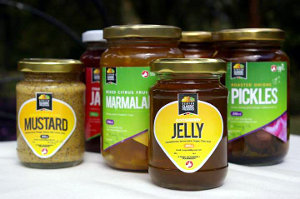Kenya’s Maria Sovich explains how she turned her love for cooking into a business
Maria Sovich spent most of her life working in upholstery, but cooking had always been her passion. Growing up, she learnt from watching her mother cook.
“I always enjoyed cooking. I had started playing around with making jams and different sauces and I sort of bettered myself when I went to live in France,” Sovich told How we made it in Africa.
When she came back to Kenya, her country of birth, Sovich decided to test the market and started making jams, sauces and marmalade, which she sold at craft fairs. Eventually she formalised the business and established Kenyan Classic Preserves.
The company currently manufactures 52 products, including mustard, pickles, marmalade, peanut butter, chutney, sun-dried tomatoes and jams of different flavours.
Sovich runs the business from her farm outside Naivasha, a town 90 kilometres north-west of Nairobi. Here she grows fruits such as raspberries, guavas, tomatoes and strawberries.
“I grow a lot of fruits that I use for this. [For] everything that I can’t grow myself, I have 12 out-growers who supply. I have set them up with seeds. They produce the fruits and I buy from them. I also farm sheep and I keep chickens and ducks,” said Sovich.
Sovich supplies her products to restaurants, hotels, mini-supermarkets and butcheries. The 65 year old entrepreneur said her strategy has been to carve out a niche for herself, as opposed to directly competing with large manufacturers.
“What we go for is quality. I can guarantee how much fruit goes into my jams. I can tell you that my jams have anything between 75% and 80% fruit. These big [manufacturers], they don’t put in that amount of fruit,” she noted.
“Our products are totally natural. The only preservative we use is lemon. We are trying to keep things as organic as possible.”
She added that the market for quality, organic and healthy products is expanding as people get more serious about their health.
Sovich uses Facebook to advertise the business. Through the platform, customers place orders for the products.
“Facebook is great. Facebook is the best thing that ever happened. It’s a great way to market our products. We put pictures on and people order through Facebook. I like putting on recipes to show people what can be done with all these different products,” she said.
Running her business from outside Nairobi, which is the firm’s largest market, is the biggest challenge Sovich faces. She has to make frequent trips to the city to make deliveries.
Maintaining consistent production of some products is also challenging due to the seasonal nature of some fruits. “From time to time there is frustration because sometimes you are waiting for things to grow and you get a lull. [Fruits] like raspberry and guava are very seasonal and people expect us to supply products all the time,” she said. “A lot of people will say, ‘why don’t you take precaution?’ I prefer to have my fruits fresh instead of deep freezing.”
Despite these challenges, Sovich told How we made it in Africa that she remains passionate about the business.
“One gets to a certain age in life that you try and find a niche for yourself that obviously suits you and something you are passionate [about] at the same time. I am passionate about what I do.”
Sovich advises other entrepreneurs to invest in things they enjoy doing.
“Work hard at it and be patient. Do it because you enjoy doing it. There is nothing worse than doing something that you don’t like.”
“Everybody can go out there and if they really put their mind to it they can do it, at whatever age, even if you are a grandmother,” Sovich said.


